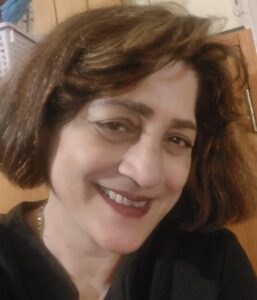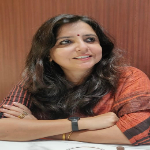INTERVIEWED BY AMANITA SEN
Sharmila Ray is a poet and non-fiction essayist, writing in English and anthologized and featured in India and abroad. Her poems, and non fictional essays have appeared in various national and international magazines and journals. She is an Associate Professor of the Department of History at City College, Kolkata. She has authored eleven books of poetry. She has edited a bilingual anthology of American and Indian writers-Bridging Continents with Gopal Lahiri. She was on the English Board of Sahitya Akademi (National Body of Letters, Govt. of India), Conducted poetry workshops organized by British Council, Poetry Society of India, Sahitya Akademi.. She has been reading her poems in India and abroad. Her poems have been translated into Hindi, Bengali, Urdu, Slovene, Hebrew and Spanish and Uzbeck. She has received many awards for poetry. She has been reading her poems in various National and International Poetry Festivals.
AS: You have been an acclaimed poet with several volumes of poetry to your credit. How do you keep yourself motivated to write on? What is your process of writing?
SR: I do not motivate myself to write. Writing for me is my way of life. I may take a pause but that is to go deep within me to find out if I can create something new, a different way of seeing than what I did in my earlier works. The smell of paper created an alternative universe for me, that was distant and at the same time warm and embracing. I knew I had to write in order to be part of that universe. I toy with an idea, perhaps, a word or phrase and then it slowly grows into poetry. While I am in the process of writing, snapshots, recollections fill me up. They do not follow any logic, rather they are off springs of the paradox. It can be in meter or in free verse, depends on the subject and how I am responding to it. It can be small or a long poem. I have no idea beforehand. I love abstract art and I love playing with colors. I have a vivid visual memory and paintings charge my creative process. As far as I am concerned poetry can be amber-ochre of Rembrandt’s universe or perhaps the warm golden of Klimt’s Kiss or become Klee’s world where art does not reflect what is seen rather it makes the hidden visible.
AS: As an academician who has devoted many years to teach, how do you see poetry fitting into this societal system, that sees students struggle to make careers often at the cost of not pursuing any form of art?
SR: Well a very meaningful question indeed! Throughout history, poetry has served as a powerful instrument of social change. Poets have used their pen to challenge prevailing power structures, provoke thought and give the marginalized a voice. I do believe poetry helps us to understand and appreciate the world around us. But for this one has to be initiated in the process and it should begin from a tender age. Moreover, I strongly believe that to pursue any form of art need not be a stumbling block for career pursuits. In fact, it can be a catharsis. In the end it is a choice between social media addiction (I feel that social media has many benefits if used properly) and meaningful preoccupation.
AS: If asked to recommend books to your readers, that they might draw inspiration from, what would those be?
SR: It is a difficult question to answer because no book is universally inspirational. It varies from person to person. I don’t like to stand on a podium and give a lecture. One has to find his/ her path and in the process can form a signature collection. It is a voyage and as you sail you pick up something which may be useful at the given point of time and then journeying forward picking up more meaningful things replacing the other. An enjoyable experience if you are willing which can bring the smell of seaweeds upon your window sill in a moment’s notice or perhaps, dollops of ice cream on a hot-humid afternoon.
AS: If asked to name four of your own books, that you wish to be read by the future generations, which ones would you recommend?
SR: A Day with Rini, Down Salt Water, With Salt and Brine and finally, Varanasi Within Varanasi.
AS: Is there any particular incident in your poetic journey that you found transformative and wish to like to share with your readers?
SR: I would like to talk of the recent pandemic. It affected each and every one of us. The lockdown made me realize that human relationship is next to breathing and our planet is very special. Life is ephemeral. All my senses became sharper. The joy and frustration of human existence, death and melancholy, warmth and closeness, all made be strong to live a new grammar of life, the total willingness to live within this paradox which in turn got reflected in my poems.
AS: What are you currently working on? What books are there now in your current reading list?
SR: Currently I am working on a collection of poems. My reading list is weird. It is layered. I have some constants and others are add ones to `be added permanently or temporarily. Italo Calvino, Jorge Luis Borges, Albert Camus (non fictional) and Pablo Neruda and Federico Garcia Lorca (poetry) with a sprinkle of Umberto Eco and a few others-my constants. At present I have read and again going through Knife: Meditations After an Attempted Murder by Salman Rushdie, French poet Emmanuel Hocquard’s The Library at Trieste. An occasional Agatha Christie and Daphne du Maurier to cool me. (which I do read most of the time).
Also, read A Review of I, Salma Selected Poems by Amanita Sen, Translated from The Tamil by K Srilata and Shobhana Kumar and published in The Antonym:
Follow The Antonym’s Facebook page and Instagram account for more content and exciting updates.



























Simply beautiful 😍